#Hal Yorke is the best character and I love him
Explore tagged Tumblr posts
Text
MASH and How It Avoided Being Military Propoganda
A mini and slightly informal essay about why I think MASH is different from other war media. Word count ~1.1k.
CW: MASH spoilers, mention of suicide, and discussion of war, obviously.
The French director François Truffaut once said, “There’s no such thing as an anti-war film," and I agree with him. Stories of tense, adrenaline-filled battles, war heroes, and the camaraderie between soldiers can be very easy to find appealing, and therefore even films intending to depict the tragedies of war can very easily fall into these tropes—especially when they depict combat. For example, in The Lost Battalion (2001), despite attempting to depict how horrific the true story of the 77th Infantry's time trapped in the Argonne Forest was, they unintentionally made war seem… cool. The stereotypically “good soldiers” are depicted to be complete badasses; good, strong, purely American men to look up to. For example, there’s a scene where the ex-Rough Rider George McMurty gets a piece of a tree branch lodged in his shoulder from an explosion, and when asked if he would like it removed, he says, “Let it sit. My mother always said I needed somewhere to hang my hat.” This detail, to my knowledge, is false (the closest I can find is that McMurty was wounded in the knee by shrapnel, as stated in the citation for the Medal of Honor he received afterwards), and an example of how even self-proclaimed "true" war stories are often inflated for the sake of drama. The main “character” of the film, Charles Whittelsey, is different in that he is depicted as an unlikely hero, as he was a New York lawyer prior to WWI and not obviously a stereotypically “good soldier." Nevertheless he is able to lead the Lost Battalion to victory, and the 77th Infantry's success in the Argonne Forest turns the war in the favor of the Allies. The fact that he is an unlikely hero makes him potentially more relatable to the audience, and therefore portrays the message that you, yes you too can do great, heroic, glorious things in war to serve your country. It’s easy to forget that Charles Whittelsey, the relatable hero who's just like you, committed suicide over what he had experienced—a detail which is conveniently left out of the scrolling conclusion text at the end of the 2001 film, though they do include the fact he also won a Medal of Honor alongside McMurty. Exaggerated lines of dialogue and idolized characterizations make it harder to remember that these were real people with real lives, who were real-life traumatized by the things they went through during war. It can make it very difficult for people to remember that war is bad, and wasteful, and that the promise of glory is propaganda meant to entice you to sign up.
Additionally I’ve noticed in the many, many war movies I have been shown/recommended over the years by older MASH fans (my father, primarily) that it’s also very difficult to remain entirely unbiased. More often than not, the films usually do take a side, even if unintentionally, and that side is almost always American. War movies very rapidly become vessels for excessive patriotism. The best example of this that I can think of off the top of my head is the film We Were Soldiers (2002), a dramatization of the Battle of Ia Drang in the Vietnam War. The film attempts to humanize the Vietnamese soldiers and people, but in my opinion does a very poor job of it, and mostly ends up being an American-loving mess (and I’m saying this as an American myself). There’s a scene where Julie Moore, the wife of the main "character" Hal Moore (portrayed by Mel Gibson, yuck, should've been my first tip-off that this movie would be shit), is delivering the death-notice telegrams to the other wives. It’s a heartbreaking scene highlighting loss… immediately undermined by the placement of American flags in the foreground and background. Something that could have been used to emphasize the humanity and waste of war is instead twisted into, “Look at how these men died for our country,” and it’s gross.
So where does MASH come into this? In my opinion, MASH is the closest anyone has ever gotten to making something truly anti-war. Granted, in the earlier seasons and in the movie and book MASH was largely passed off as a comedy, but once the show took on a more serious tone and switched directorial and writing hands (thank you Harry Morgan and Alan Alda), it really came into its own. And how did it do this? Primarily by not showing combat. MASH is about doctors, so the depiction of actual battle in is incredibly limited. The majority of what the audience is presented with is the behind-the-scenes. They see the infuriating military bureaucracy, the constant sense of hopelessness, the terrible living conditions, and, most importantly, the never-ending wave of bodies. The audience is primarily shown the aftermath. Most deaths are off-screen too, and the ones meant to really get to the viewer aren't allowed the opportunity to breathe. They aren't given space because, in the reality of war, that's just how it is. Take Henry Blake's death at the end of Season 3. While not the first major character death, it's certainly one of the most jarring. And after hearing the news, everyone just has to... keep working. They aren't allowed to grieve, and therefore the audience isn't either. It emphasizes the waste of war: abrupt, quick, and dirty. Additionally, MASH is not patriotic. The primary characters are very vocal with their dissatisfaction with their country. Hawkeye makes biting, cynical remarks about Truman and America's involvement in Korea, and how shitty his job really is. "I'm here to pull bodies out of a sausage grinder," as he puts. MASH avoids excessive and biased patriotism by, rather than attempting to appeal to both sides, rejecting them all instead. It focusses purely on the human element of war. There are also several episodes throughout the series highlighting the absurdity of the way the American public is made to think of war as some righteous struggle young American men are fighting, and the propaganda associated with it (my favorite example, S4 E24 “Deluge”, cuts back and forth between the characters of MASH as they go about their day-to-day lives at war and real-life Korean War propaganda and news from the time).
Now, I will admit that I'm probably biased. MASH has been something that I've hyperfixated on periodically over the course of nearly four years now. I love MASH. A lot. I'm a professional MASH glazer. This specifically, however, is something I have been thinking about a lot more recently and discussing with people I know in real life, so I figured I'd put it out for the general public (niche Tumblr fandom) to see. If you agree, great! If you don't, feel free to tell me why. It probably just means that you know of a movie/show/book/etc that I don't, and I'm always open to expanding my war media/history library. Anyway, if you've made it this far in listening to me ramble on, thank you for reading :)
8 notes
·
View notes
Text
Is he pan?
disclaimer: this is a hc, not speculating on what the writers intentions were.


reason: Firstly, I could write an essay about how vampires are inherently pan. But talking about Hal specifically: the writers put him in a bloody tank top and had him sing "Puttin' On the Ritz" while turning a bunch of people into vampires. That is not Straight Behavior. His love for Tom (male best friend) is arguably stronger than his love for Alex (female love interest). Also, you don't live for hundreds of years without exploring your sexuality at least a little.
14 notes
·
View notes
Note
Fic authors self rec! When you get this, reply with your favorite five fics that you've written, then pass on to at least five other writers. spread the self-love ❤
HECK. Ummmm okay okay... I'll do my best.
Surface Tension
I'm taking this opportunity to highlight a fic that I wrote for an anthology I put together with a team of *very* talented writers and artists, Metal Gear Solid: Lost Years. I had wanted to tell a story about Hal's isolation and vulnerability in his youth, the aspects of his past that made him an easy target for predatory behavior- and even though this story isn't particularly long, I think it's the one I spent the longest working on (in a words per day sense). Writing this story made me dead sure that Kojima was referencing the movie "The Graduate" when it came to the Emmerichs, and I tried to channel that sort of listlessness into this story. Because it was for a zine, I don't think it got many hits or comments, so I'm putting it here now.
The Man in the Mask
My own little "hit in the face by Apollo's red playground ball" of a fic- I actually wrote this Spideypool AU to deal with my frustrations regarding the handling of asylum seekers at the border- but the pandemic aspects of the story ended up hitting very close to home for everyone just a few years later. Fun! This is one of those stories I thought of as a "weird one that nobody read" but when I looked at my actual hit counter, I saw it had proven more popular than I realized, so that's good for me? It's a bit of a bottle episode that is more about Wade and Peter than Deadpool and Spider-Man and has a more sedate tone for most of it, but I'm partial to the way the story unfolds.
Pictures of You
Another Metal Gear story, this was for the Otasune Zine "Let the World Be". I got to team up with the incredible Harshai who did the illustrations for this story in the zine. It's a collection of moments during Dave and Hal's Philanthropy days, each one with an accompanying photograph. It's a pretty soft one, but one that comes to mind a lot, especially when I'm in the car and staring out the window at the landscape, thinking about these two on the open road. It also comes to mind every time I see a ridiculous food challenge posted on a restaurant wall. I need to see about getting permission to share the art in the posted fic, because I think it really adds something, especially the last image which was a polaroid of Sunny besting Hal's time eating the enourmous burger.
Five Years Later
Yeah, it's a WIP. What are you gonna do about it? Back from hiatus, it's the second installment of a "mostly MCU compliant" Spideypool "met as childhood friends" AU that my friend @343enderspark and I have been working on for years. In this portion of the story, Wade is dealing with life in a world without Peter (oh, and half the population, I guess) and slowly starting his journey of training and eventually becoming the person he was meant to be. (And the Defenders show up because I literally could not resist.) I got to try my hand at writing a lot of different characters in this fic, so it's been fun to flex those muscles. We had a long break between the first and second chapter, but we're back on track and CH 3 is drafted and waiting on edits, so that should be out soon. :3
Home's Around the Corner (It's a Long Way There)
More WIPs? Yeah. More AU's? Double yeah, because this one is more or less an AU or an AU. XD This is a new project I'm working on with @blissful-thinker that's Earth-65 but a step to the left, where Matt wasn't adopted by the Hand, but ended up staying with the Chaste, and returns to New York City years later only to find out he doesn't really have a place in his old home anymore. (Or does he?) This one has been a lot of fun and allows me to write one of my favorite things- tired DA Nelson, and also too-big-for-her-britches Gwen, haha. It may be niche, but it's *my* niche.
#i was sent this twice but i'm only gonna do it once#this is bullying i'm being bullied#daredevil#metal gear solid#spideypool#my fics#earth-65#otasune#mattfoggy
19 notes
·
View notes
Text
*Throws a smoke grenade on the ground and rolls into place as the air clears*
(Okay, I'm prefacing this by saying this is Comic Only Canon stuff. I've watched exactly three episodes of Young Justice. Some things have also been retconned.)
Roy Harper has gone by several hero names. He started as Speedy, the sidekick and ward to Green Arrow. From there, he became Arsenal and Red Arrow.
Roy was the orphan of a parks services employee who was killed in a fire when he was a toddler. He was raised by a Navajo tribal elder called Brave Bow, who taught him archery. Roy's Navajo roots are very important to him- he prays in Diné bizaad(which was his first language), raised his daughter to have a connection with that part of their heritage, and spends time on his home reservation a lot.
When he was sixteen or seventeen, Oliver just kind of... Fucked off with Hal Jordan to see America. While he was gone, Roy couldn't really handle being on his own (I'm not gonna get into opinions on Oliver Queen here, because it's a really divided camp) for so long and started using drugs as a way to cope. He eventually started using heroin. When Ollie found out, he kicked him out. For a time, Roy was homeless. He's relapsed a few times, but has been sober for a while now.
While his friends from the Titans like Dick and Wally were going off to college, Roy started to work as an undercover agent for Checkmate, as well as a sharp shooter. During on of his missions he met Jade Nguyen, aka Cheshire. They slept together and she conceived Lian. Roy didn't know about this until Lian was already a few months old. He fought for, and won custody of her. But he makes sure to keep Jade as a part of her life, bringing her to see her in prison regularly.
Lian was killed in an attack on Star City. In the Convergence event, a time traveller 'rescued' her the morning of the attack to bring her forward in time, to manipulate Roy into killing his friends. He didn't, but saved Lian anyway. So it is canon that on New Earth at least, Roy and Lian are alive and well, picking up right where they left off. On Prime Earth, Lian wasn't killed but thrown around in time. She's now a young teenager instead of a five year old, but she's back with Roy.
After one of his relapses, Roy decided he should check into a rehab facility called Sanctuary, where he was killed. He was resurrected during a multiversal reboot.
Some Roy Trivia Tidbits:
He is Jason Todd's best friend.
The two of them ran a Heroes For Hire business with the contact number RED-ARSE
He and Jason shared (or possibly still do share) a bank account
He led one of the Teen Titans teams
Bart Allen calls him Dad sometimes
He used to be a drummer in a band called Great Frog
He's a horny slut and proud of it
He is very open and affectionate with his friends. He frequently tells them he loves them, and isn't shy about hugs
When he lived in New York with the Outsiders, his nannies for Lian were men
He will stand up to Batman about how he treats his kids
Waylon Jones (Killer Croc) is his rehab sponsor, and considers Roy the 'Only good thing he's done in his life'
He is an Omega. (*squints down at the smudged writing on my hand*) Oh! He's an Omega Lantern. He's also a Black Lantern.
Seriously, he's an Arrow and a Lantern two times over. He's Batman's worst nightmare for a son in law...
The characters he's paired with most regularly:
Jason Todd ("That's my Jaybird.")
Kori Anders ("Best. Girlfriend. Ever.")
Jason Todd and Kori Anders ("We're supposed to be together, dammit. That's the only destiny that matters to me.")
Dick Grayson ("I always thought you boys would make a swell couple. In an erotic Butch and Sundance kind of way...")
Wally West ("You're looking at me kinda weird." "It must be love.")
Donna Troy ("There you are, my handsome little Artemis.")
Grace Choi ("You've gotta stop carrying me around." "You love it.")
Someone give me a crash course in Roy Harper!! I want to add him to Hyena and Hood but I know nothing about him ;o; His name is Arsenal right? Is he Lian's father or is that the clone? The clone's name is... Will?
65 notes
·
View notes
Text
30-day Couple Challenge: Day 0
Right here we go!
The couple I am choosing is my OCs, Jamie Gray and Hal Wiley. I'm trying to write a book on them (emphasis on trying) and it mostly takes place in 1860s America.

Quick character introductions below the cut :D
Hal (1841-1915)
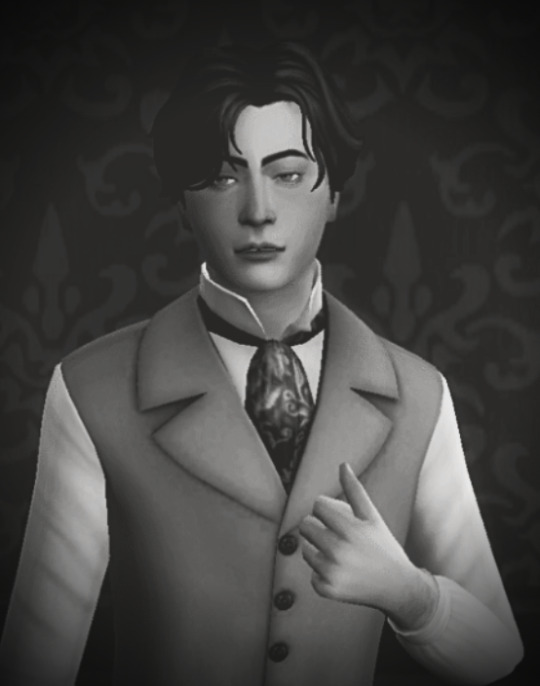
Henry Peter Alexander Wiley IV (aka Hal) is the third child and first son of a prominent New York City newspaper owner. He develops chronic fatigue syndrome at age 18, which basically means he gets very tired very easily. Hal's closest childhood friend was Jamie Gray, and eventually their relationship grew to something more romantic. Just when they decide to run away together, the America Civil War breaks out and Jamie enlists (Hal's illness prevents him from joining him). They are reunited in 1862 when Jamie is shot in the leg (later amputated) during the Battle of Antietam, causing Hal to a fucking house and move Jamie there to recover. Past this I kind of have not figured out their plot past my boys grow old and happy together <3
Jamie (1841-1918)

Edward James Gray (nicknamed Jamie) is the second son and child of Andrew Gray, who struck it rich when Jamie was young, during the gold rush. Jamie grew up very much in love with his best friend Hal, and was devastated when Hal went off to boarding school in London. Later, when the American Civil War starts, Jamie enlists (mostly to get away from his abusive father). At the Battle of Antietam, Jamie (by then Lieutenant Gray) is shot in the leg, which later has to be amputated*. You already know the rest, he moves in with Hal and they live happily ever after yay :D
(in these screenshots Jamie always looks vaguely confused and it is Very Accurate lol)
*Jamie usually uses crutches after this, but sadly in the Sims 4 there aren't very many antique-looking crutches so most of the time J is using this prosthetic leg from TSR

CC links!
Hal: Hair (Sammy) - Blush - Outfit
Jamie: Hair - Blush - Cheeks (in this SFS folder) - Outfit - Prosthetic Leg - (he doesn't have it here but in future looks) Freckles
#fun fact: while writing this i got my first ever nosebleed :D#shooby 30 day challenge#sims4#simblr#the sims 4#sims 4#ts4 historical#ts4 challenge#lookbooks#lookbook#ts4 lookbook
15 notes
·
View notes
Text


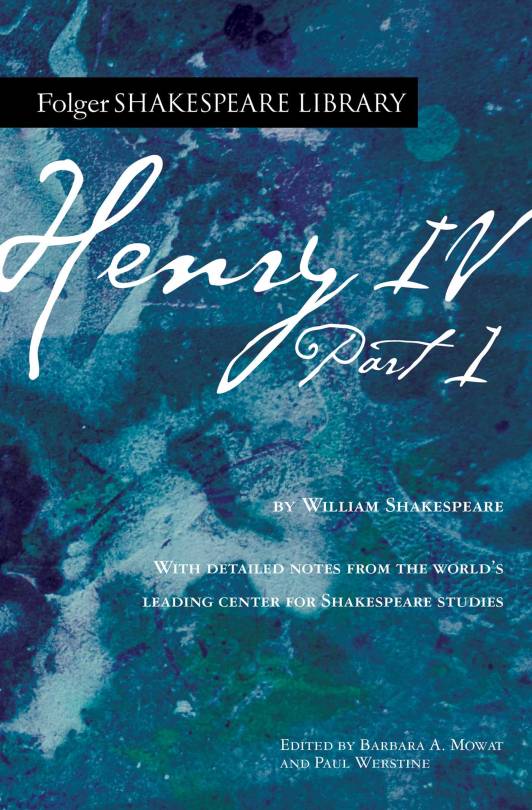

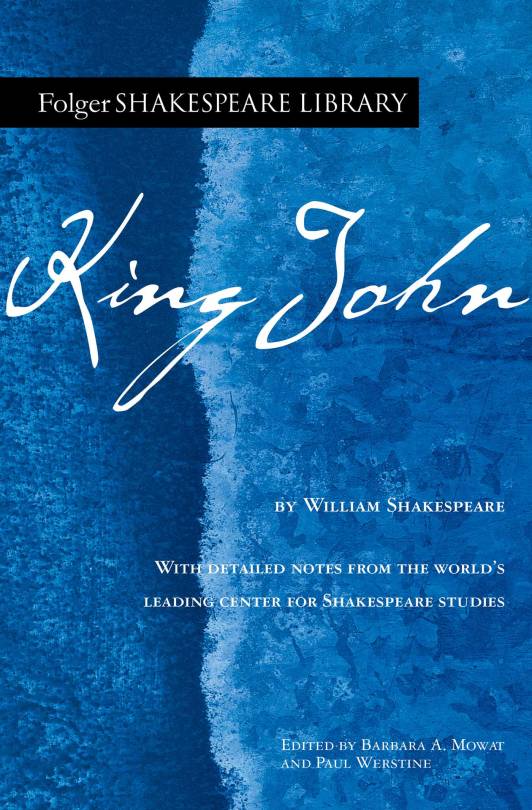

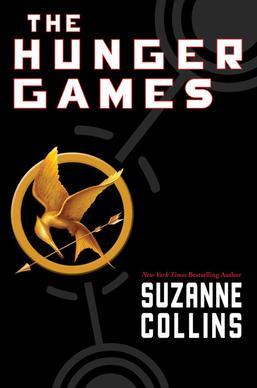


wip inspiration tag — next day after dawn
thank you max @goose-books for the tag!! the rules for this one are list as many inspirations/influences as you would like for your current work in progress, and explain how they’ve shaped your project!
next day after dawn (or, the project formerly known as historieswip) is a second word political fiction novel that's basically a mishmash shakespeare's histories with 90% less battle scenes and 90% more insane family dynamics. after everyone's favourite boyboss war criminal king gets deposed, his inner circle gets locked up by the new regime, and we follow them as they try to figure out what to do next and slowly drive each other insane.
tagging: @wren-is-writing @athenapollo @avi-why and anyone else who wants to do this!
henry vi part 3 (aka the whole wars of the roses tetralogy): there's a reason this project is just nicknamed historieswip. ohhhhh babygirl we got histories and i am not preserving shakespeare's timelines at ALL, i am just throwing those babies in a blender until i get 1. vaguely medieval english political structures 2. war with not-france 3. huge royal family with so much wrong with them. but from the henry vi plays specifically! this is where like half of the characters come from. the prince cyrus/cassandane/darcy dynamic is just the henry vi/margaret/suffolk love triangle, the house of lunares is the house of york: girlboss edition, and everything about the prince cyrus and mona dynamic comes from me Thinking about henry vi and richard iii foils moments. i could say more but we'd be here all day.
henry iv part 1 (and kind of 2): so. king cyrus is hal but that's also so mean to hal because king cyrus is SO much worse. however. he does have the hal backstory, by which i mean he was a rakish little alcoholic prince with a gay little boytoy until his dad died and then he had to get Serious and banish all his besties. and renan is his poins except if poins didn't get banished and stuck as the world's most depressed advisor faking respectability instead. ALSO kane my best friend kane is basically my hotspur <33
henry v: again, king cyrus is basically just henry v with the war crimes dialed up to 11. this one is the main inspiration for his conquering hero era and also the conflict with not-france and the not-french wife. it's also where i stole the title from!
king john: most of the histories i'm stealing from are at least like. connected to each other. king john is not but i love philip the bastard so fucking much so he's here (with extra transmasc aroace swag). that's helios — the war hero king's bastard who shows up to rise above his station and annoy everyone around him. and maybe be terminally loyal to a king who really doesn't deserve it
succession: the elevator pitch for this project is basically shakespeare's histories meets succession. specifically, season 1 episode 2 of succession, where the all-powerful patriarch is suddenly out of commission and maybe never coming back and the rest of the family is left losing their minds and wondering what the fuck they do now.
the hunger games: here's where i put on my clown shoes and admit that. um. you know how i said kane is hotspur. well he is but he's ALSO cato from the hunger games, as characterized in the criminally long fanfiction i wrote in middle school. and drea is um. clove. ANYWAY. thg is also an inspiration in terms of worldbuilding because i'm going for something kind of post-post-apocalyptic where there are vast disparities in technology in different parts of the country after decades of war and inequality. so we get modern tech plus medieval weapons, thank god.
darkling: this is partly a hatecrime against max my best friend max @goose-books because once upon a time i started jokingly shipping the two horrible old men in this book and then got so attached to the dynamic that i fully imported it into this project and made it canon gay. sorry bestie. but GENUINELY darkling is one of the best fucking books i've ever read and such a huge inspiration for how i do shakespeare retellings and also fucked up family dynamics.
gideon the ninth: this book is really nothing like gtn but i have to give it a shoutout because reading gtn was what inspired me to create this project! basically because i remembered how much i love ensemble casts and decided i wanted to write one. there are some similarities in terms of the vibe of everyone being locked in a big fucked up house together and everyone having super on the nose themed names but really just shoutout to tamsyn muir for being such a good writer that she made me want what she had (so many blorbos)
thank you for coming to my ted talk <3
16 notes
·
View notes
Note
1 & 18 jsa, 10 gl (any), 15 johnny q >:)
YIPPEE
Favorite character from [IF]
ALAN SCOTT OF COURSE i love almost the entire jsa with very very few exceptions but alan's my all time all time character no matter what
18. Brotp from [IF]
one of the best things about the jsa is that a lot of completely deranged friendship combinations just work and make for some extremely entertaining reading so i think you can get away with pairing off anybody with just about anybody and it'll be hilarious but. if i really had to choose. i think i'll go with rex tyler & charles mcnider based on their canon dynamic alone (doctor trying to stop patient from killing himself, patient mistaking that for friendship etc)
10. What are your head cannons about [Character, IF, etc]?
kyle rayner is autistic and probably has been diagnosed since he was a kid (given that one mention of special ed classes and such). uhhhh. hal was forty-six when he died in 1996 and by god he returned that age. both of hal's brothers are alive and they've probably suspected he's gay ever since he started his drifting at the age of twenty something (results pending). hal fucked up his knee something awful in the coast city fight with mongul and that's also something he came back with. kyle and jennie are permanently on & off dating (but mostly on). alan has an entire room in his penthouse dedicated to his model train collection. okay i think that's the extent of my gl-related hcs
NO WAIT
hal's only possible happy ending is still being supremely broke but living in a hangar with his plane like maverick in the new top gun. nothing military related though, just his air taxi business from the 1990 run. THAT'S IT
15. What are your sexuality head canons for [character]?
johnny quick is bi but never found himself especially interested in any women before libby came along (which is practically true! women are nonexistent in his 1940s stories!). his sexuality isn't something he's particularly hung up on because life's often light and breezy to johnny but i think if he's dated, when he's dated, it's almost always been something of a status symbol to him more than actual interest in the person he's with, especially after the divorce and his terrible sleazy businessman era (see: jsa 1992's "i'm dating a woman half my age!"). he probably used to be a pretty frequent visitor of new york's old timey gay bars back in the day but obviously between libby and then having to raise jesse all by his lonesome, romance and/or one night stands weren't on the agenda for a long long time
5 notes
·
View notes
Note
!! !! !! <3
HI ILYSM <3 <3
this got Long so uh
you are being gifted my son, Henry Peter Alexander Wiley IV
he was born on March 13, 1843, to a prominent lawyer and his wife
the Wileys are RICH - they have a New York City house where they usually stayed called Wiley Manor, as well as homes in London, Virginia, and a small "cabin" (mansion) in southern France
before meeting the other character in my story, Jamie, he goes by Four (because he's the fourth of his name) or Harry
Four has 3 older sisters and is the first son and heir to his father's sizable fortune
he meets Jamie (Edward James Gray) when they're both 7 and they immediately become friends
Jamie gives him the nickname of Hal!! and theyre best friends!! and oh my god i love them so fucking much!!
(J wasnt born rich, his father struck gold in the Gold Rush and only now are the Grays being introduced to high society)
at 11, Hal begins attending a boarding school in Massachusetts, but he only lasts about a year before having a nervous breakdown. he's autistic and has social anxiety (wow ant whered you get that from huh) and was bullied a bunch and it got to be too much for our poor boy
for the next few years he has several private tutors and does a Lot of reading (boy loves to read)
his father pressures him to Go to School and Be Normal and Stop Letting Down the Family which only makes Hal's anxiety worse fuck his dad >:(
at 16 he realizes OH SHIT IM IN LOVE WITH JAMIE
it takes him a few months to tell him but once he does they start courting and it's v cute <3 <3 <3
then of course Hal's dad decides to send him to a school in South Carolina where his cousin Josiah goes and this time Hal can't come up with good enough arguments and has to go
he's at boarding school until age 18, and while there he and Jamie write a bunch of really romantic sappy letters
Hal's home for christmas break in 1861 when the Civil War breaks out, but it doesn't really impact him all too much, except that his father decides it's too risky for him to go back to school because SC is now part of the confederacy
while at school Hal started getting symptoms of Chronic Fatigue Syndrome and now it's getting worse, so he spends a lot of the next couple months in bed recovering
by fall he's feeling better and he and Jamie can go be their gay selves
BUT THEN in October Hal is engaged (without his permission to the daughter of his father's friend, Miss Hattie Parker
Hal doesnt tell Jamie immediately but J finds out about it anyways and gets angry bc his boyfriend didnt. tell him abt being engaged
around that same time J's father discovers a letter between him and Hal (it has J's name on it but not Hal's, so Mr Asshole doesnt know it's him) and threatens to kill and/or disinherit him
for some unknown reason J decides that the only way to prevent this is to enlist in the war so he goes in down that
fuck this is getting long im gonna finish the rest in @mattwife-mattnipulate-mattsplain's ask
but thank you so much pol ily /p
4 notes
·
View notes
Text
Riverdale S5 E14 (The Rabies Episode) - 5 Things I loved/ 3 Things to Consider.
Things I loved
1) What good are you? What do you even do? - I’m a writer! I tell stories!
I love the interesting and frankly, very funny thoughts that Riverdale the show keeps putting out about writing, the ethics of fiction, and how it feels to be a fiction creator through the character of Jughead. The writers of Riverdale are describing us the viewers to be these overwhelming, demanding RATS (and as ‘customers’ of their product we are ‘King’) that have trapped them in a tunnel (of the writer’s room? RAS, maybe you need to update their furniture?) hollering at them to entertain us while they desperately try to tell us a story so we don’t kill them. I hope this doesn’t court controversy but I was much more appeased by this depiction of me than the BBC Sherlock thing that portrayed its own fans as crazy pathetic loons. Riverdale writers think we’re insane too, but they find us scary and they want to please us. Very gratifying. (I’m a happy customer.)
2) Related: I LOVED that Jughead is not a snob about genre. Getting published and read by a lot of people is the point! I love that about him. So he did maybe learn something in his one year at college.
3) I loved the variation on ‘darkness’ and ‘dark hole’ that they worked out for each of Betty, Jughead and Archie. It’s literal and metaphor (they can’t see where they’re going, they can’t easily escape, the air is close and poisoned, there’s danger in the dark hole and so on). The literary dorkiness of the episode structure was fabulous.
For Jughead it’s a mirror image replica of what happened to him before - Jughead falls into an abandoned subway tunnel via a sudden sinkhole that opens up underneath him during a period of life that’s supposed to be triumphant, exactly like how as he’d finally finished with high school and was about to embark on college like his dad always wanted, Betty took the security of his relationship with her away from him and he descended to a state of absolute homelessness in the bunker.
For Archie, the boy who tried to be all the things everyone around him wanted him to be, becoming a miner comes about because someone else (Cheryl) wanted to defeat Hiram Lodge (which Archie is always up for) and all the other boys in his ‘gang’ are looking for economic opportunities and a group project (which Archie is also always up for).
For Betty, the hubristic violent girl who denies how much she enjoys violence and always just goes wading into danger, the scale of the consequences she faces for her reckless brand of courage has gotten much more serious, because she’s an adult. From having a serial killer (Hal, her father) very interested in her and then being in a game set up by a different serial killer (Penelope, her aunt by marriage), Betty’s ‘hole’ moment is to be the sole prey of a serial killer who will not grant her freedom of movement, and isn’t trying to make some sort of moral point or work out a piece of their own psychology. TBK purely wants Betty to suffer and die - there’s nothing for her to figure out with her intellect.
4) I loved that the show firmly concludes that there is no talking and feeling your way through to somewhere better with a misogynist. It’s not that misogynist women killers don’t know that women are people, that women have pasts and a right to live and all of that. They know. They like trampling on the thing that is precious and beautiful, and it’s fun for them to hurt women. This is very dark, but on really bad days I can fall into this thinking, and I felt seen. Same goes for Alice giving into despair and advising Betty to just kill the bastard. I know how that feels too.
5) This is another weird thing to love, but I love that Archie’s fundamental decency and kindness is not enough to overcome the weight of his war trauma. And yet he’s capable when it comes to an emergency. The tendency that Archie has to run towards the screaming is similar to what Kevin used to be like, and I admire this about him. I very much appreciated that Eric and Uncle Fucking Frank and all the guys who down in the mine want Archie to get professional help for his problems.
3 Things to Think About
a. Jughead never graduated from college. So he set himself up for the social isolation and failure in New York City. To have no job to go to, to have no cluster of acquaintances you can carry over from being students in the same institution for two to four years, or being a part of a religion, in a major city, is kind of dooming yourself to failure in this regard. I’ve thought Jughead no longer wanted to go to college but had gone purely for FP (with whom he no longer speaks much) which is why he finds it so unrewarding.
b. Cheryl is an ‘author’ in the same way Jughead is, but she seems to see the darkest possible side of the people she ‘portrays’ and ‘frames’ which is in direct opposition to Jughead, who ‘writes’ people the way he wishes they could be, as their best selves. Then he falls in love with his creation and believes in it so hard that he hallucinates his own subconscious and intuition in their image (Betty).
c. I’m very interested in the Jess-Jughead relationship. When he goes to visit her after their breakup (when she still has his manuscript I think??) her apartment is well appointed and tidy. So it’s Jughead that’s the slob, and Jessica was just vengefully matching him debris for debris.
32 notes
·
View notes
Text
Lessons from the Screen: Jasmine (Blue Jasmine)

Played by Cate Blanchett, Jasmine is the titular character to Woody Allen's film, Blue Jasmine. It's one of my favourite films not because Jasmine is a character to aspire to, but rather one to take lessons from.
Who is Jasmine?
Born Jeanette, she was adopted along with her sister Ginger. She changes her name to Jasmine, likely when she was 18 since she had met her husband Hal as Jasmine and he is said to have fallen in love with the name Jasmine. (Jasmine does lie about the origins of her name afterwards, saying that her parents named her after their favourite flower - night blooming jasmine). She drops out of school to marry him and thereafter lives the life of a Manhattan socialite.
We don't know much of her past but it can be inferred that Jasmine likely came from the lower middle to middle class.
Her Husband's Arrest and Death
Jasmine's husband Hal, was arrested on charges of embezzlement and fraud. As a result, all of their assets were frozen and seized. Hal had committed suicide while arrested, likely knowing that he couldn't do the jail time and couldn't bear the humiliation. Jasmine was able to hide a few things to sell but has to take a job - a retail position at a shoe store and had to wait upon women with whom she had hosted previously at luncheons.
Moving to San Francisco
Jasmine moves in with her sister, after not being able to afford her Brooklyn rent and finding herself in a mountain of debt. Ginger lives a strictly lower-middle class life with her two children.
Jasmine decides she wants to become an interior decorator and knows she can get a qualification online. However as she knows nothing about using a computer, she takes a class on how to use them.
Lessons we can learn
Do not drop out of school to get married.
In the first scene of the film, Jasmine mentions that she was in school studying anthropology but drops out of school after marrying Hal. So now that her husband is dead, she has to support herself now (since their assets were seized).
Lesson: Do not give up your education for anyone. You are the one living your life so do what's best for you. Knowledge is something that no one can take from you! If someone wants to marry you but wants you to drop out of school for it, don't bother with them as they may be trying to make you completely dependent on them.
Keep employable hobbies.
"But what if they're so wealthy I don't actually have to work? Isn't that the whole point?"
Jasmine thought that too. Until she her husband was arrested and committed suicide. She notes that she had always been interested in interior decorating, citing her 'great taste' and experience in decorating her homes. However now that she has to provide for herself, she can't work as an interior decorator since she doesn't have a licence.
Lesson: Even if you marry wealthy, you should cultivate some kind of hobby that can be turned into a career. Event hosting/planning, interior decoration, designing, matchmaking even - things that can be considered hobbies and yet can turn into business ideas. This is made even better by the fact you may be socialising with a different cohort of potential clients if you do decide to turn it into a business.
Have an exit plan and money of your own.
Jasmine is forced to move from New York City to San Francisco because she can't afford to live there and was forced to take a low paying retail job. She had no money of her own - rather her husband provided her the money to live the lavish lifestyle she once did.
Lesson: Be sure to have a 'worst case scenario' plan just in case. You should also have a bank account that is completely separate from your partner's - an emergency fund. Make sure it covers at least 6 months of expenses but keep adding to it when you can since money can mean freedom. Hell even keeping a packed Louis Vuitton suitcase in the event you need to get out of the house quickly may not be a bad idea either.
Understand what you're signing
Normally a spouse is not likely to get into trouble if her husband is arrested for embezzlement and fraud. However since Jasmine's signature is on a lot of the business documents, she is almost indicted along with her husband.
Lesson: Read what you're signing! Understand what you're signing. If you have trouble understanding what you're signing, consult someone in the legal profession.
Have classic pieces that never go out of style
Jasmine manages to keep a few things when she moves to San Francisco, which captures the attention of a potential suitor at a party. She manages to keep a Chanel jacket, one of her Hermes Birkins (B35, Gold with gold hardware), Roger Vivier shoes, Chanel belt and her full set of monogrammed Louis Vuitton luggage. In fact, her religiously wears her Chanel jacket and Birkin everwhere although it's seen more as Jasmine trying desperately to hold onto her previous life.
Lesson: While you don't have to have a Chanel jacket or an Hermes Birkin, you can still have classic pieces without the price tag. Nowadays there are more affordable coats and jackets that are timeless - wrap coats, trench coats, pea coats. If you can't afford a designer bag, choose one that has a timeless silhouette, minimal decorative details and minimal hardware.
28 notes
·
View notes
Text
˗ˏˋ new year, new smut! ˎˊ˗
First, let me start by saying that the list below does not include everything gathered from the smut survey. In fact, it’s not even half! There were a lot of kinks and character combos that were voted on and submitted, so it may take some time to go through all of them to see what smutty ideas arise! But I’ve already begun to brainstorm some of the “free choice” prompts, and some of you may recognize yours below.
Second of all, I know it’s not realistic to think I’ll even get through half of this list; the last time I shared my prompts with y’all, I only ended up writing two and scrapping the rest because I’d no longer felt excited about them. But I’m posting this anyway because I wanted to keep y’all in the loop, and also because I’m hoping that reading them will excite you!
.
.
.
2021 smut list
last updated: 8/2/21 (decided to not update and go off of this list anymore because my interest in ideas just changes too often!)
.
.
betty
Archie/Betty - Archie accidentally catches Betty in her wig and lingerie
Betty/others - Betty goes undercover as a sex worker while working an FBI case
Betty/FP/Fred/Tom/Hiram - The Riverdale Dads love Betty in her Vixens uniform
Bret/Betty/Donna - continuation of “a weekend away” in which Bret invites Donna to play with Betty
FILLED! Black Hood/Betty - continuation of “we all need a little scream” (chapter 2) in which The Black Hood agrees to stop his killings as long as Betty continues to meet him at the abandoned house at the edge of Fox Forest
Chuck/Betty - continuation of “right where you want it”
Chuck/Betty/Bulldogs - The Bulldogs choose Betty to be their Vixen of the season during their traditional after-game celebrations
Hal (as the Black Hood)/Betty - continuation of “put you on a pedestal”
Hiram/Betty - continuation of a decadent deal series in which Hiram fucks Betty with expensive objects, e.g. a Fabergé egg, an expensive bottle of alcohol, a golden statue
Hiram/Betty/FP - continuation of a decadent deal series
Honey/Betty - Mr. Honey gives Betty a chance to prove herself when her grades start slipping
FP/Betty - Betty lets slip to FP that she’s masturbated to fantasies of him before
FP/Betty/Charles - continuation of the under the same roof series in which FP decides that Charles and Betty need to spend quality time to make up for their lost childhood together
FILLED! FP/Betty/Sweet Pea - FP decides it's never too late for a former Serpent King to thank his righthand man for his loyalty.
FILLED! FP/Betty - FP makes Betty come 18 times for her 18th birthday
Reggie/Betty - Reggie and Betty hook up in the hot tub on their senior trip
Reggie/Betty - Reggie and Betty enjoy pretending to be strangers at a bar that pick each other up for one night stands
Reggie/Betty - Reggie gets Betty to try jingle jangle for the first time
Reggie/Betty/Sweet Pea - Betty wants to help her boyfriend Reggie have a better relationship with his half-brother Sweet Pea, and it ends up being a bonding experience for all three of them
Serpents/Bulldogs/Betty - Both the Serpents and the Bulldogs try to “claim” Betty for the Southside and the Northside and turn it into a competition for dark web to judge, unbeknownst to Betty herself
Sweet Pea/Betty - Sweet Pea disposes of a body for Betty in return for owning hers
Sweet Pea/Betty/Fangs - Sweet Pea and Fangs have their own initiation with Betty after her Serpent Dance
FILLED! Sweet Pea/Betty - Sweet Pea decides that Betty could use a little stress relief
-
veronica
FILLED! Bret/Veronica - Bret drugs Veronica’s rum when she sneaks into the Quill and Skull party as “Monica Posh” and takes her back to his room to fuck her
Chad/Veronica - Chad exploits Veronica’s determination to make their marriage work by pushing her to her limits
Frank/Veronica - continuation/expansion of their snippets from “what’s a sleepover without a little smut?” in which Frank blackmails Veronica into being his sex slave and takes her to a bar with him to meet with his mercenary friends
FILLED! Hiram/Veronica - Hiram and Veronica make the most of their time together before Veronica is off to college
FILLED! Hiram/Veronica - Veronica has a chance to prove to her father that she's ready to take her place in the Family business
Hiram/Veronica/FP - FP agrees to convince Jughead not to publish the article on Hiram is he gets to fuck Veronica as payment
Sweet Pea/Veronica/Fangs - continuation of “late nights at la bonne nuit” in which
Veronica/Elio/Nick/others - Veronica learns that there’s a perverse ritual in determining which mobster prince gets her hand in marriage
Veronica/teachers - Veronica has her own scandalous reason for needing to leave New York after her father’s arrest
-
cheryl
FP/Cheryl/Southsiders - FP takes Cheryl on a drive through the Southside in her own car as punishment for being so reckless
Serpents/Cheryl - Cheryl works for her mother's brothel and the Serpents pool their money together to pay for a night with her
Serpents/Cheryl - Rather than letting Jason risk his life to do a job for the Serpents so he and Polly could run away, Cheryl meets with the Serpent King herself, and FP promises to help Jason out in return for Cheryl becoming the Serpents’ personal pet
-
multi
FILLED! Betty/Veronica - Betty promises to do anything to prove to Veronica how sorry she is
Betty/Veronica/Sweet Pea - Betty turns to Veronica for advice in how to win Sweet Pea over
Cheryl/Veronica/Sweet Pea/Fangs - continuation of “late nights at la bonne nuit” in which Veronica invites Cheryl to celebrate the success of their new rum with Sweet Pea and Fangs
FILLED! FP/Betty/Veronica/Tom - continuation of “when we come, we come together” in which FP knows Tom is feeling lonely with his wife stationed overseas, so he invites Tom over to fuck Betty and Veronica to cheer him up
FP/Betty/Veronica - continuation of a package deal series
Hiram/Betty/Veronica - Hiram exploits Veronica’s weakness over her best friend and forces them together in exchange for Hiram sparing Betty
26 notes
·
View notes
Text
The Apartment (1960); AFI #80
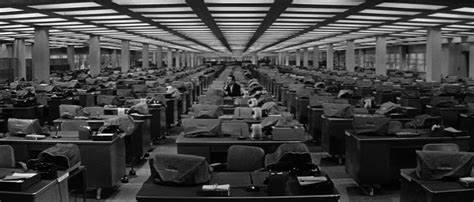
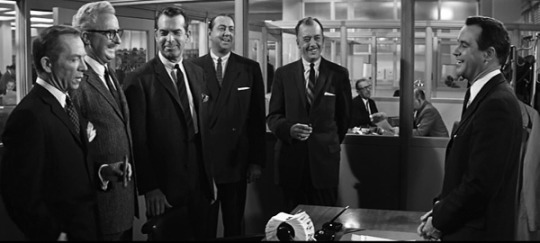
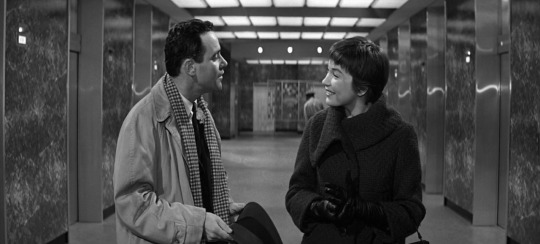
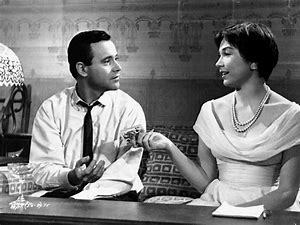
The next film on the list that we reviewed was the one of the last black and white films to win best picture, The Apartment (1960). The film actually held the title of last B&W Best Picture winner for 50 years until The Artist came along in in 2011. Along with Best Picture, the film was nominated for 10 Oscars and won Best Director, Best Screenplay, Best Art Direction, and Best Editing. The film also won Best Picture from the Golden Globes, the BAFTAs, the Director’s Guild Awards, and the Critic’s Circle Awards. Truly a great synthesis of acting, directing, cinematography, music, and story, this movie is one of the lesser known greatest films of all time. I have more to say about this film, but I want to go over the story in all of its excellence. But first...
SPOILER ALERT!!! THIS COMEDY HAS LEGITIMATE SURPRISES AND SUBJECT MATTER THAT WOULDN’T FLY TODAY!!! TRULY A GREAT FILM THAT NEEDS TO BE SEEN!!! I STRONGLY SUGGEST WATCHING IT INSTEAD OF JUST READING THE STORY LINE!!!
----------------------------------------------------------------------------
An opening run of establishing shots with a voice over by the main character lets the audience know that he is a drone accountant at a giant firm with little chance to move up in the world. C.C. Baxter (Jack Lemmon) is a lonely office drudge at a national insurance corporation in New York City. He has lucked out and found a way to leverage his home in order to climb the corporate ladder. Baxter allows four company managers to take turns borrowing his Upper West Side apartment for their extramarital liaisons, which he manages with a detailed schedule. Baxter has not seen any movement, but he is constantly offered the promise of a promotion since he is a “team player.”
One of the serious down sides of this ploy is that his apartment is in constant use and the bosses are making a mess and drinking all his liquor. C.C. has no place to go some nights so he stays and works late. Because C.C. is constantly going in and out and people can hear women in his apartment, he is starting to develop a different kind of reputation with the other tenants. While unable to enter his own apartment when it is in use, his neighbors assume that their neighbor is a playboy bringing home a different woman every night.
C.C. is able to get glowing performance reports from his four managers and he is able to submit them to the personnel director, Jeff D. Sheldrake (Fred MacMurray), in hope of a promotion. Sheldrake promises to promote him, but demands that he also receive use of the apartment for his own affairs, beginning that night. As compensation for such short notice, he gives Baxter two theater tickets to The Music Man. After work, C.C. asks Fran Kubelik (Shirley MacLaine), an elevator operator in the office building, to go to the musical with him. She agrees but goes first to meet with a "former fling," who turns out to be Sheldrake, and let him know there will be no more meetings. When Sheldrake dissuades her from breaking up with him and promising to divorce his wife for her, they go to the apartment as poor Baxter waits forlornly outside the theater.
Later, at the company's raucous Christmas party (there is dancing on the tables and the lamest strip tease of all time), Fran is told by Miss Olsen (Edie Adams), Sheldrake's secretary, that Sheldrake has also had affairs with her and other women employees. Later at Baxter’s apartment, Fran confronts Sheldrake with his lies. Sheldrake maintains that he genuinely loves her, but that he has no intention of splitting up with his wife. He then leaves to return to his suburban family as usual and Fran is so depressed that she finds sleeping pills in the apartment bathroom and attempts suicide.
Baxter learns through finding a dropped hand mirror that Fran is the woman Sheldrake has been taking to his apartment, so he goes to a bar and lets himself be picked up by a married woman. When they arrive at his apartment, he is shocked to find Fran in his bed, seemingly dead. He sends his pick-up away and enlists the help of his neighbor, Dr. Dreyfuss (Jack Krushen), to revive Fran without notifying the authorities. I should not laugh, but it is pretty funny that the doctor goes straight to slapping Fran in the face to wake her up. The actors did not hold back; he is slapping her in the face really hard, so much so that you can tell her cheeks are reddening even in black and white. Baxter makes Dreyfuss believe that he was the cause of the incident and, scolding his neighbor for his apparent philandering, Dreyfuss advises him to "be a mensch, a human being."
As Fran spends two days recuperating in the apartment, C.C. takes care of her, and a bond develops between them, especially after he confesses to having attempted suicide himself over unrequited feelings for a woman who now sends him a fruitcake every Christmas. While they play a game of gin rummy, Fran reveals that she has always suffered bad luck in her love life. As Baxter prepares a romantic dinner, one of the managers arrives with a woman. Although Baxter persuades them to leave, the manager recognizes Fran and informs his colleagues. Later confronted by Fran's brother-in-law, Karl Matuschka, who is looking for her, the managers direct Karl to the apartment out of jealousy. At the apartment, Karl's anger at Fran for her behavior is deflected by Baxter, who again takes responsibility. Karl punches C.C. (and interviews with Lemmon revealed that the punch did land), but when Fran kisses him for protecting her, he just smiles and says it "didn't hurt a bit."
Sheldrake learns that Miss Olsen told Fran about his affairs, so he makes the poor choice of firing the woman who knows of all his dealings, and she retaliates by meeting with Sheldrake's wife, who promptly throws her husband out. Sheldrake believes that this situation just makes it easier to pursue his affair with Fran. Having promoted C.C. to an even higher position, which also gives him a key to the executive washroom, Sheldrake expects Baxter to loan out his apartment yet again. Baxter gives him back the washroom key instead, proclaiming that he has decided to become a mensch, and quits the firm.
That night at a New Year's Eve party, Sheldrake indignantly tells Fran what happened. Realizing she is in love with Baxter, Fran abandons Sheldrake and runs to the apartment. At the door, she hears what sounds like a gunshot. Fearing that Baxter has attempted suicide again, she frantically pounds on the door. Baxter answers, holding a bottle of champagne whose cork he had just popped in celebration of his plan to start anew. As the two settle down to resume their gin rummy game, Fran tells C.C. that she is now free too. When he asks about Sheldrake, she replies, "We'll send him a fruitcake every Christmas." He declares his love for her, and she replies, "Shut up and deal."
---------------------------------------------------------------------------
This film is one of the most praised movies of all time, but it is not one of the most generally well known. This is probably due to the subject matter, although It’s A Wonderful Life also deals with suicide and is one of the America’s most popular family films. The problem is most likely that extra marital affairs by big company management as a normal thing was highly frowned upon. With the whole #MeToo movement, it seems that this kind of philandering culture might very well have been a known problem for decades. A movie based around the premise that office managers need a nice place to have sex with secretaries and elevator girls would not have been acceptable under the Hays Code. This is also the second film on the AFI list where Fred MacMurray plays a bad guy before being the understanding patriarch on My Three Sons and the first person honored as a Disney Legend in 1987. Fun fact, MacMurray was an uncredited extra in a film called Girls Gone Wild in 1929.
Billy Wilder knew that this was going to be a divisive film due to content, but he also had the confidence that everything would work out following the massive success of his previous film, Some Like It Hot. Wilder had considered a film based on adultery back in the 1940s but was unable to get funding at the time due to the Hays Code. The film was also based on a real life Hollywood drama in which an agent was shot by a producer over an affair (in which a low level employee apartment was used) as well as a friend of a co-writer who returned home to a dead ex-girlfriend following a break-up.
It is amazing to think that this film is described as a comedy. There are office politics in which mid-level managers use local celeb status to take advantage of their subordinates. There are half a dozen cheating husbands that string along their affairs. There are characters so hurt that they would rather die than deal with what is done with them. There are raging parties at work where everyone gets massively drunk and dance on the desks. Women are treated like objects that either need to be protected with violence or thrown away. And yet the film is legitimately fun with characters that are worth rooting for.
Some of the success rides on the fabulous acting of Jack Lemmon and Shirley MacLaine and the witty dialogue written by I.A.L. Diamond. In fact, the dialogue and limited characters feels a lot like a stage play, which come to fruition in the form of Promises, Promises on Broadway by Burt Bacharach, Hal David, and Neil Simon. Dealing with real sets and locations, however, resulted in some colds and sickness since the actors were really out in the New York snow. Some other realism in the film came from both lead actors taking blows for the film: Shirley MacLaine got proper slapped by the doctor and Jack Lemmon was really punched by the brother-in-law.
A stand out aspect for me in this film which I talk up quite a bit is the cinematography. I have used many screen grabs from the film and used them as my avatar. I identify with the feeling of being used for something which made a mid manager look good while allowing them to do bad things. In fact, I am sure that everyone has felt like a Baxter at some point, and it is great to see him stand up for himself. Here are a couple of screen grabs (besides the top photo above) that I have used:
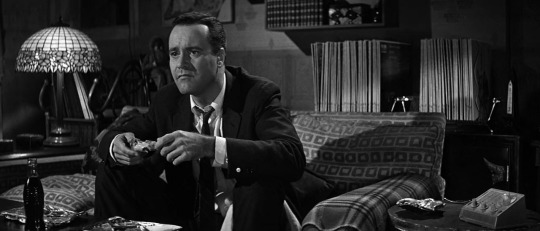

That lonely man in the middle of countless empty desks, that look of frustration when others are using your things to live a better life than you, and that time that love makes utility become fun and gadgets seem pretentious. It is very easy for me to get lost in how much I love this film. It has been far and away my favorite find from the AFI Top 100 between when I first saw the film in 2014 and now.
So, should the film be on the top 100 list? It has the awards and the history along with being a fantastic film. Of course it belongs on the list. Would I recommend it? Yes. This film is the type that makes people like me want to go through lists like this. I had never heard of the film in 2014 and it floored me how good it was. Each time I watch I appreciate it more, and the whole film project becomes well worth my time and effort. This film is so good, it affirms my life choices. I invite and implore you to check it out for yourself.
#the apartment#jack lemmon#shirley maclaine#best picture#black and white#classic hollywood#cinematography#introvert#introverts#award winner#classic film#60s#comedy#billy wilder#perfect movies
18 notes
·
View notes
Text
LIZ HAS THE FLIMJABS
December 30, 1950

“Liz Has the Flimjabs” (aka “A Severe Case of Flimjabs”) is episode #112 of the radio series MY FAVORITE HUSBAND broadcast on December 30, 1950.
This was the 14th episode of the third season of MY FAVORITE HUSBAND. There were 31 new episodes, with the season ending on March 31, 1951.
Synopsis ~ Liz wants a mink coat from George, so she pretends to be sick in order to get his sympathy - and the coat! George is on to her tactics, and decides to give her the scare of her life - literally!
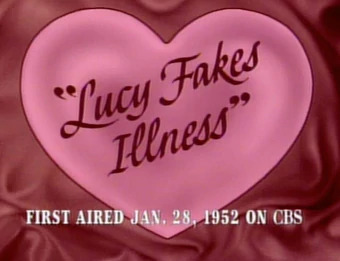
Note: This program served as the basis for the “I Love Lucy” episode “Lucy Fakes Illness” (ILL S1;E16) filmed on December 18, 1951 and first aired on January 28, 1952. The role of the Doctor was taken by Hal March, who was actually playing an actor friend of Ricky’s named Hal March pretending to be a doctor. On television, Lucy also adopts a psychological illness in addition to her physical ailments. There was no mention of Christmas or New Years on the television show.

“My Favorite Husband” was based on the novels Mr. and Mrs. Cugat, the Record of a Happy Marriage (1940) and Outside Eden (1945) by Isabel Scott Rorick, which had previously been adapted into the film Are Husbands Necessary? (1942). “My Favorite Husband” was first broadcast as a one-time special on July 5, 1948. Lucille Ball and Lee Bowman played the characters of Liz and George Cugat, and a positive response to this broadcast convinced CBS to launch “My Favorite Husband” as a series. Bowman was not available Richard Denning was cast as George. On January 7, 1949, confusion with bandleader Xavier Cugat prompted a name change to Cooper. On this same episode Jell-O became its sponsor. A total of 124 episodes of the program aired from July 23, 1948 through March 31, 1951. After about ten episodes had been written, writers Fox and Davenport departed and three new writers took over – Bob Carroll, Jr., Madelyn Pugh, and head writer/producer Jess Oppenheimer. In March 1949 Gale Gordon took over the existing role of George’s boss, Rudolph Atterbury, and Bea Benaderet was added as his wife, Iris. CBS brought “My Favorite Husband” to television in 1953, starring Joan Caulfield and Barry Nelson as Liz and George Cooper. The television version ran two-and-a-half seasons, from September 1953 through December 1955, running concurrently with “I Love Lucy.” It was produced live at CBS Television City for most of its run, until switching to film for a truncated third season filmed (ironically) at Desilu and recasting Liz Cooper with Vanessa Brown.
MAIN CAST

Lucille Ball (Liz Cooper) was born on August 6, 1911 in Jamestown, New York. She began her screen career in 1933 and was known in Hollywood as ‘Queen of the B’s’ due to her many appearances in ‘B’ movies. With Richard Denning, she starred in a radio program titled “My Favorite Husband” which eventually led to the creation of “I Love Lucy,” a television situation comedy in which she co-starred with her real-life husband, Latin bandleader Desi Arnaz. The program was phenomenally successful, allowing the couple to purchase what was once RKO Studios, re-naming it Desilu. When the show ended in 1960 (in an hour-long format known as “The Lucy-Desi Comedy Hour”) so did Lucy and Desi’s marriage. In 1962, hoping to keep Desilu financially solvent, Lucy returned to the sitcom format with “The Lucy Show,” which lasted six seasons. She followed that with a similar sitcom “Here’s Lucy” co-starring with her real-life children, Lucie and Desi Jr., as well as Gale Gordon, who had joined the cast of “The Lucy Show” during season two. Before her death in 1989, Lucy made one more attempt at a sitcom with “Life With Lucy,” also with Gordon.
Richard Denning (George Cooper) was born Louis Albert Heindrich Denninger Jr., in Poughkeepsie, New York. When he was 18 months old, his family moved to Los Angeles. Plans called for him to take over his father’s garment manufacturing business, but he developed an interest in acting. Denning enlisted in the US Navy during World War II. He is best known for his roles in various science fiction and horror films of the 1950s. Although he teamed with Lucille Ball on radio in “My Favorite Husband,” the two never acted together on screen. While “I Love Lucy” was on the air, he was seen on another CBS TV series, “Mr. & Mrs. North.” From 1968 to 1980 he played the Governor on “Hawaii 5-0″, his final role. He died in 1998 at age 84.
Bea Benadaret (Iris Atterbury) was considered the front-runner to be cast as Ethel Mertz but when “I Love Lucy” was ready to start production she was already playing a similar role on TV’s “The George Burns and Gracie Allen Show” so Vivian Vance was cast instead. On “I Love Lucy” she was cast as Lucy Ricardo’s spinster neighbor, Miss Lewis, in “Lucy Plays Cupid” (ILL S1;E15) in early 1952. Later, she was a success in her own show, “Petticoat Junction” as Shady Rest Hotel proprietress Kate Bradley. She starred in the series until her death in 1968.
Ruth Perrott (Katie, the Maid) was also later seen on “I Love Lucy.” She first played Mrs. Pomerantz, a member of the surprise investigating committee for the Society Matrons League in “Pioneer Women” (ILL S1;E25), as one of the member of the Wednesday Afternoon Fine Arts League in “Lucy and Ethel Buy the Same Dress” (ILL S3;E3), and also played a nurse when “Lucy Goes to the Hospital” (ILL S2;E16). She died in 1996 at the age of 96.
Bob LeMond (Announcer) also served as the announcer for the pilot episode of “I Love Lucy”. When the long-lost pilot was finally discovered in 1990, a few moments of the opening narration were damaged and lost, so LeMond – fifty years later – recreated the narration for the CBS special and subsequent DVD release.
Gale Gordon (Rudolph Atterbury) does not appear in this episode.
GUEST CAST

Frank Nelson (Dr. Stevenson) was born on May 6, 1911 (three months before Lucille Ball) in Colorado Springs, Colorado. He started working as a radio announcer at the age of 15. He later appeared on such popular radio shows as “The Great Gildersleeve,” “Burns and Allen,” and “Fibber McGee & Molly”. Aside from Lucille Ball, Nelson is perhaps most associated with Jack Benny and was a fifteen-year regular on his radio and television programs. His trademark was playing clerks and other working stiffs, suddenly turning to Benny with a drawn out “Yeeeeeeeeees?” Nelson appeared in 11 episodes of “I Love Lucy”, including three as quiz master Freddy Fillmore, and two as Ralph Ramsey, plus appearance on “The Lucy-Desi Comedy Hour” - making him the only actor to play two different recurring roles on “I Love Lucy.” Nelson returned to the role of the frazzled Train Conductor for an episode of “The Lucy Show” in 1963. This marks his final appearance on a Lucille Ball sitcom.
The doctor’s surname may be a reference to noted costume designer Edward Stevenson, who designed gowns for Lucille Ball in more than a dozen RKO films and would eventually become costume designer of “I Love Lucy” after the departure of Elois Jenssen in 1955.
EPISODE
ANNOUNCER: “And now, let’s look in on the Coopers. It’s evening, and Liz and George are sitting in the living room admiring their Christmas tree."

George wonders if it is time to take the Christmas tree down but Liz doesn’t want to. They agree to put away their presents instead and start to talk about the gifts they didn’t give or get.
Liz nearly bought George a set of matching golf clubs. George says he nearly bought her a mink jacket. He says he saw it in the window at Millers, but realized he couldn’t afford it. Liz sadly reminds him that she has never had a fur coat and wonders if they could afford it if they all their Christmas gifts to the store. George says it still wouldn’t be enough, but Liz wants to wear something special to the Atterbury’s New Year’s Eve party.
Next morning, in the kitchen, Katie the Maid asks Liz why she is so sad. Liz tells her about her mink jacket dreams. Liz solicits Katie’s opinion on how she can’t best get George to get her a mink jacket in time for the party. Liz decides to play sick since George always gets her what she wants when she’s ill.
After dinner, Liz and George contemplate what to do. Liz suggests going to the movies to see Harvey starring Jimmy Stewart, which is playing at the Strand.
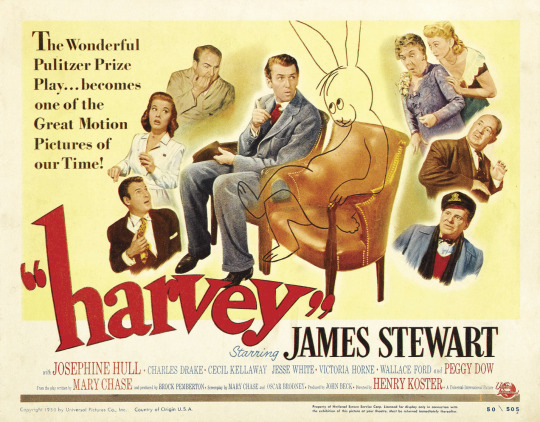
Harvey is a comedy about a man whose best friend is a six-foot tall imaginary rabbit. It premiered just ten days earlier before this broadcast and starred James Stewart. The film won an Oscar for Josephine Hull. The screenplay was based on the 1944 Broadway play of the same name by Mary Chase which won the 1945 Pulitzer Prize for Drama.
Before Liz can tell George the second feature, she starts to writhe in pain! Amid moans and groans, Liz details the pain for George. She says she used to have these attacks as a child. When she says the only thing that sometimes helps is little gifts to make her happy, George gets suspicious. He quickly leaves the room to make a phone call, which Liz thinks is to buy her a mink jacket, but he has actually called the doctor!
End of Part One

Bob LeMond presents a live Jell-O commercial, giving a basic recipe for preparation of all delicious six flavors!
ANNOUNCER: “As we look in on the Coopers once again, Liz is pretending to be sick and George, who is worried about her, has called the doctor.”
The doorbell rings and George admits Dr. Stevenson (Frank Nelson). Before seeing Liz, George tips him off that Liz may have a rare disease and that the only cure is a mink coat! George asks him to give her a good scare and the Doctor agrees to play along.

Entering the bedroom, Liz immediately tells the Doctor she feels much better. But after a quick exam, the Doctor diagnoses Liz with a rare tropical disease from the West Indies called the ‘Flimjabs’. The only cure is to operate and remove her ‘torkle’ but warns her that she will never be able to ‘yammle’ again. The Doctor explains that ‘yammling’ is an involuntary peristalsis of the transverse clavis.
GEORGE: “Doctor, do you have to remove the whole torkle?” DOCTOR: “Maybe we’ll be lucky and can save half of it. After all, half a torkle is better than none.” LIZ: “Well, I should say so! I’d hate to think of never yammeling again!”
The Doctor says that they must now wait 24 hours and see if she turns green.
DOCTOR: “If you turn green, three hours later (snaps his fingers) gone.” LIZ: (snaps) “Gone?” DOCTOR: (snaps) “Gone.”

For the television script, the ‘Flimjabs’ was renamed the 'Gobloots’ - a rare tropical disease that carried into America on the hind legs of the 'boo-shoo bird.’ It can necessitate a person having to undergo a 'zorchectomy’ – total or partial removal of the 'zorch’. Even if doctors are able to save half a person’s 'zorch,’ the patient will never be able to 'trummle’ again. 'Trummling’ is a mysterious involuntary internal process. Finally, if you turn green while suffering from the 'gobloots’ you will be dead in 30 minutes!
Iris Atterbury drops by to see Liz on her way to the Bridge Club meeting. Liz tells her that she has been diagnosed with the Flimjabs.
IRIS: “Oh, how exciting! This will make Betty Ricky’s gallstones look sick! She’ll be absolutely green.” LIZ: “She's not the only one. That’s one of the danger signs. I may turn green.” IRIS: “With a green face and red hair, you’ll be out of this world.” LIZ: “Yes, that’s what I’m afraid of.”
Iris is overcome with emotion at the thought of losing Liz. She doesn’t want to leave, but the ice cream for the Bridge Club meeting is in the car and it’s melting!
That night, Doctor Stevenson returns to check on Liz. Answering the door, George confesses that he’s put a green light bulb in Liz’s bedroom light. As soon as George turns on the lights, Liz shrieks seeing her green hands! Her face and hair have turned green, too! Liz thinks the men have Flimjabs too, because they are also green, but then the truth sets in.

LIZ: “Oh, no! This is the end! I’m looking at the world through green colored eyeballs!”
Liz dramatically declares that she’s dying. George accuses her of being over-dramatic.
LIZ: “I’m sorry, George. But I don’t die every day and it’s new to me.”
Before her imminent demise, Liz confesses to all the car accidents she’s had and hidden by having the car fixed without telling him.
LIZ: “In fact, the only thing left of the original car you bought is the ashtray in the back seat!”
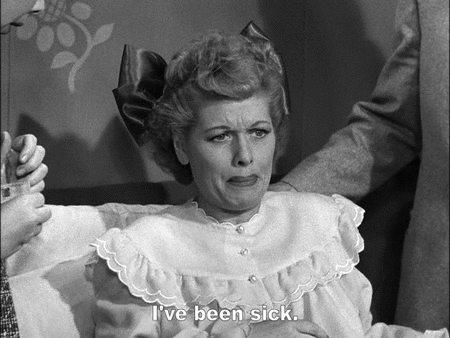
Then Liz bravely confesses to pretending to be sick to get him to buy her a mink coat. George also needs to make a confession: it was all a trick. There is no such thing as ‘Flimjabs’ and the light is from a green light bulb!
The phone rings and it is Iris, tearfully calling from the Bridge Club meeting. The girls have just had a memorial ceremony for Liz by turning her chair to the wall and smashing her teacup in the fireplace. Before Liz can tell Iris that it was a joke, she learns that they all chipped in and bought her a goodbye present: a mink coat! Liz hangs up in tears. George is confused.
GEORGE: “Isn’t that what you wanted?” LIZ: “Yeah, but I have to die to get it!”
END OF EPISODE
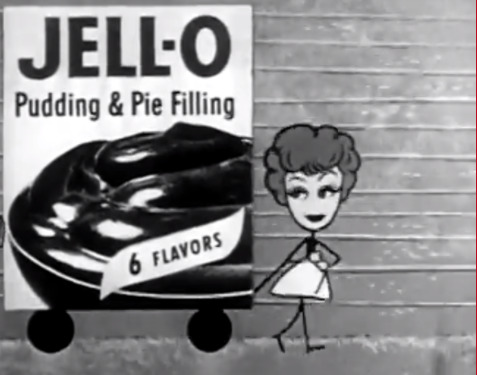
In the live Jell-O commercial, Lucille Ball and Bob LeMond play a couple of nomads lost in the desert. Lucy uses her ‘Isabella Clump’ voice as ‘Smith’. Bob is looking for his camp, near a big dune.
LUCY / ‘SMITH’: “A dune? What’s a dune?” BOB: “What’s a dune????” LUCY / ‘SMITH’: “I dunno. What’s a-dune with you?”
Smith sees a mirage - a big bowl of Jell-O! After describing the six delicious flavors, Bob suggests they go home.
BOB: “Go home? We’re lost in the desert!” LUCY / ‘SMITH’: “Why don’t we each take one of those cars.” BOB: “What cars?” LUCY / ‘SMITH’: “The ones over there. That’s a two-car mirage!”


The same date this episode was broadcast, columnist Sid Shalit in the New York Daily News reported that a television situation comedy was being prepared starring Lucille Ball and Desi Arnaz in the mold of “My Favorite Husband”. Clearly, the radio series was winding down. This was the final episode of 1950 with only 16 episodes left.

Meanwhile, in addition to radio and television, Ball was on the nation’s movie screens in two 1950 films: The Fuller Brush Girl and Fancy Pants.
#My Favorite Husband#Liz has the Flimjabs#I Love Lucy#Lucy Fakes Illness#Lucille Ball#Richard Denning#Bea Benadaret#Ruth Perrott#Bob Lemond#Radio#CBS#Jello#1950#Harvey#Jimmy Stewart#Frank Nelson#Fuller Brush Girl#Fancy Pants
11 notes
·
View notes
Photo

Kirk Douglas, acclaimed actor, dead at 103
His only Oscar was an honorary award but Kirk Douglas became a Hollywood icon, with a film career spanning seven decades.
He prided himself on playing the tough guys, the sort of characters he once described as "sons of bitches".
He threw himself into his many roles with relish, acting with an intensity that often spilled over into his private life.
And he had a fine contempt for the Hollywood studio establishment, something that may well have made his career less successful than it was.
Kirk Douglas was born Issur Danielovitch Demsky to penniless Jewish immigrants in the city of Amsterdam, New York state, in 1916. His father had fled Russia to escape conscription into the Tsar's army.
One of seven children, he sold snacks to local mill workers to earn enough money to buy food and in his autobiography claims to have had more than 40 jobs.
It was when he began acting in school plays that he decided a theatrical career was for him. "The one thing in my life that I always knew, that was always constant, was that I wanted to be an actor."
Already an inter-collegiate wrestling champion, he paid his way through drama college by fighting professionally, ushering and working as a car park attendant and bellhop.
He attended the American Academy of Dramatic Arts where among his classmates were Betty Joan Perske, later to be known as Lauren Bacall, and the Bermudian actress Diana Dill.
He began using the name Kirk Douglas while acting during the college break and made his first Broadway appearance under his new name in a small part in a musical.
In 1941 he enlisted in the US Navy but was invalided out two years later because of injury and, in November 1943, he married his former classmate Diana Dill.
The marriage lasted eight years and produced two children, Michael, who would follow in his father's footsteps as an actor, and Joel, who became a film producer.
Douglas had initially planned to become a stage actor but Lauren Bacall recommended him to producer Hal B Wallis who was casting The Strange Love of Martha Ivers.
Douglas successfully tested for the lead role, playing opposite Barbara Stanwyck, already an established star.
He first made his name as a washed-up boxer, Midge Kelly, in Champion in 1949, which earned him the first of three Oscar nominations.
Although he never won the coveted award, Douglas was honoured in the 1996 Academy Awards for 50 years as a creative and moral force in the movie industry.
One critic claimed the Kelly role epitomised his persona on and off screen as "a ruthless, selfish, fiercely driven upstart".
His ambition was rooted in his humble Russian origins. He was determined to defy privilege and anti-Semitism.
Several of his most famous roles were as villains, such as the ruthless journalist in Ace In The Hole in 1951, who refuses to let sentiment or morality get in the way of a good story.
He won critical acclaim for his portrayal of Vincent van Gogh in Lust for Life in 1956, but his own lust for power earned him many enemies.
One of his more notable roles of this period was as Colonel Dax, the commander of a French regiment on the Western Front in the Stanley Kubrick film, Paths of Glory
Based on a real-life incident, Douglas is called upon to defend three soldiers charged with mutiny, who are eventually shot. Douglas resisted attempts by Kubrick to change the ending and reprieve the men.
In 1957 Douglas set up his own production company Byrna, named after his mother, in a bid to escape the grip of the big studios, which hired and fired at whim.
He also defied the anti-communist witch-hunts of the McCarthy era by openly hiring a blacklisted writer, Dalton Trumbo, to script Spartacus.
The movie, about a slave who rebelled against the Roman Empire, was seen by many as a metaphor for his own defiance of Tinseltown's power brokers.
Despite being riddled with historical inaccuracies, the film went on to win four Oscars.
Douglas faded from the big screen in the 1970s but in his later years made a fairly successful comeback in films such as Tough Guys with Burt Lancaster and Greedy with Michael J Fox.
His energy did not flag as he grew older. He became a director, producer and novelist.
Douglas served four US presidents in the role of special ambassador, and in 1981 received the Presidential Medal of Freedom.
He also created a charitable foundation and donated more than $1m to the Motion Picture and Television Fund.
His autobiography, The Ragman's Son, made the New York Times best-seller list.
Douglas also wrote two novels, Dance with the Devil and The Secret.
As well as Michael and Joel, the children from his first marriage, he had two more sons, who also followed him into the world of movies.
Eric became an actor and Peter became a producer but only his eldest child, Michael, came close to equalling his father's fame.
Eric died in 2004 after an overdose of alcohol and prescription drugs, in what authorities in New York ruled was an accidental death.
Douglas, who was given a lifetime achievement award from the American Film Institute in 1991, suffered a stroke in March 1996 which paralysed one side of his face.
But despite the stroke affecting his ability to speak, he was able to give the acceptance speech at the 1996 Academy Awards when he received a special award for "50 years as a moral and creative force in the motion picture community".
In the same year he played Chester J Lampwick in an episode of the hit animated series The Simpsons.
He continued to work, and appeared in films including Diamonds, in which he appeared with his old friend, Lauren Bacall, and It Runs in the Family in 2003, which co-starred his son Michael, grandson Cameron and ex-wife Diana.
Kirk Douglas was one of the last great Hollywood stars who began their climb to fame at the end of World War Two and certainly one of the most defiant.
"I don't need a critic to tell me I'm an actor," he once said. " I make my own way. Nobody's my boss. Nobody's ever been my boss."
Daily inspiration. Discover more photos at http://justforbooks.tumblr.com
94 notes
·
View notes
Photo




I loved and admired Hal beyond words, and I know he cared for me when he entrusted me to cover two very demanding roles on Broadway; Nora Helmer in the musical “A Doll’s Life” and Christine Daaé in the original company of “The Phantom of the Opera”!
Both tasks were engulfed in the most stressful of situations. The first surrounded by constant changes and the overbearing sense of doom that hung over all of us; especially our esteemed director. The latter was a political firestorm that Hal was not in a position to fix or protect me. I won’t get into the Phantom political arena, but suffice it to say the rumor mill can take care of all that. Hal once stated “you are the strongest woman I know and can handle it!” I never forgot those words, and even though I have run away from the circus, I take solace in his words as I think of him today. Hopefully, he knows how much his mentorship and support continued to sustain me during those intense years!
I was cast in the 1982 production of “A Doll’s Life” as the Assistant Stage Manager/Helga the Maid/Opera Attendee, but I was also the Understudy to the leading lady Betsy Joslyn as Nora.... Anyway, we were in technical rehearsals at the Ahmanson Theatre in L.A. and as the Asst. Stage Manager; I was responsible for taking everything off a side table so another actor could strike it before a large blue print of the set painted on canvas could rise from the floor and fly out when Nora slammed the door to leave her old life and take the audience from the Present into the the late 1800’s as Nora begins new adventures.
I made many attempts to remove pencils, legal pads, a pack of cigarettes, an ashtray, the script and a couple of books as quickly as I could, but kept dropping something every time. It was at this point that Hal came rushing up to the stage enraged that I was holding up the entire opening set move! By this time, I was so frustrated myself that I just yelled right back at him that “I only have two arms and ten fingers and that there is no way I could strike all the damn props in time!” There was a terrible silence, and I suddenly realized that I had just talked back to one of the most famous and esteemed directors of the American Theater. I also realized that there would probably be a “pink slip” heading my way, and I should start packing because my job would be over.
Hal stared back at me for a few seconds (that seemed more like an hour) and said “she is absolutely right! What can we do here to help Patti?” That was when the real Stage Manager, the late great and amazing Beverly Randolph, suggested having a cardboard box by the side table that I could pick up and sweep all of the items with my arm in order to quickly exit Stage Left for my own costume change. Hal grinned and said “Great….lets move on!” It worked, and my employment continued with the Broadway production from Los Angeles to New York, but ended when the show closed after eighteen Previews and five performances.
I suppose the best memory for me during “A Doll’s Life” was when I was suddenly on for Betsy in New York during Previews. I was sitting in her dressing room with five minutes to go before I was to be onstage. Terrified and beyond nervous; all of a sudden Hal knocked heavily on the door which made me practically jump off the stool. He peaked in with those glasses on top of his follicled challenged head and said “I’ve heard so much about your performance I can hardly wait!” He slammed the door shut and that little moment certainly upped the ante!
At intermission, all I remember is him rushing down the hallway, picking me up and twirling me around in a huge bear hug, and telling Beverly to order blonde wigs for me immediately. From that moment on, he always thought of me as a blonde! He even ordered more highlights to my Christine wig which to this day made me think I looked more like the Bride of Frankenstein then a Swedish soprano.
Ultimately, I take pride in the fact that I was able to reprise Christine in the First National Tour of Canada where Hal really focused on me and refined my performance. Our relationship was based on trust! He expected me to have a point of view for my character, and didn’t like a lot of questions. He painted pictures, and you were part of the portrait. If you were prepared he was ecstatic, and when he did have something to say it was profound and enlightening.
-Patti Cohenour
68 notes
·
View notes
Audio
On Broadway, Old Shows and New Tricks (Jeff Lunden; NPR - April 2013)
Internet Interview Archive - 3/∞
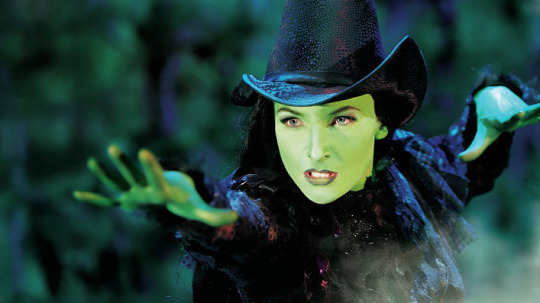
*transcript under the cut*
When I was a teenager falling in love with the theater, I picked up a book called Broadway's Greatest Musicals. The sole criterion for inclusion was that a show run for at least 500 performances, which translates to about a year and a quarter.
How quaint.
I was thinking about that when I attended the 25th-anniversary performance of The Phantom of the Opera, now ranked as Broadway's longest-running musical ever. The show was in great shape — in some respects maybe better than when it opened — and I asked the Phantom's legendary director, Hal Prince, how often he came to see it in a year, expecting him to say once or twice. His answer surprised me.
"I see the show probably at least a dozen times a year, but I rehearse them four times a year," Prince says. "And it's a hell of a happy responsibility, you know what I mean? I'm very grateful for it."
Hugh Panaro plays the title character — here done up as The Red Death for the show's spectacular masked-ball scene — in The Phantom of the Opera, Broadway's longest-running show. Twenty-two years ago, Panaro made his debut with the show as Raoul, the male romantic lead.
Hugh Panaro, who plays the Phantom, has a unique perspective. His first stint with the show was 22 years ago, when he played the young lover Raoul. Over the years, Panaro has left the show to do other roles, but he's returned several times. All told, he's played the Phantom for over 1,700 performances.
While he says those rehearsals with Prince are crucial, part of what keeps things fresh for him is that he has played opposite so many actresses in the lead role of Christine. He doesn't have an exact count, but he can wager a guess.
"Fifteen, easily!" Panaro says. "And that's not counting understudies; that's counting girls that have held this contract, from the time I was Raoul 'til now. I get two Christines a week" — the part is daunting enough that a different actress performs at matinees — "and no two Christines are alike, which is the beauty of it. So I get a fresh pair of eyes every night, pretty much."
Getting It Right, Eight Times A Week
Up on West 51st Street at the Gershwin Theatre, production stage manager Marybeth Abel is putting a new actor into the role of the munchkin Boq in Wicked, the prequel to The Wizard of Oz, which will be celebrating its 10th anniversary this October. In her office backstage, she explains what she does.
"I always say my primary job is to make sure the show goes on every night as scheduled, and that we do it successfully and we get a standing ovation at the end of the night," Abel says, laughing.
So she works with the actors and the backstage crew — there are about 120 people on Wicked — to make sure the show runs smoothly eight times a week.
But she also takes charge of afternoon and evening rehearsals, teaching understudies and new performers their blocking — where to move onstage and when.
"Hands down, when you're in a long-run show, the best thing that happens is there's turnover in cast," Abel says. "That's the best thing that happens, because all those influxes of difference make everybody, like, step up!"
One of the new actors Abel has put in the show is Willemijn Verkaik, in the role of Elphaba — the green girl who becomes the Wicked Witch of the West. Verkaik is from the Netherlands and has played Elphaba in Europe in both Dutch and German. Now she's hit a trifecta, doing it on Broadway in English.
Even if she's following in the footsteps — literally — of Tony Award winner Idina Menzel, who created the role, she says she's found ways to make the part her own.
"You are an actor, so you have to play it yourself, and you have to make it believable; you have to believe it yourself, so you have to go on that journey yourself," Verkaik says. "And that is what the director helps you to do."
'It's Not A Factory Job'
Every show has a resident director, who acts as a liaison between the original creators and the cast. That's John Stefaniuk's job at The Lion King, which recently celebrated its 15th anniversary. He travels the globe overseeing as many as eight productions of the show, working closely with all the actors.
"It's not a factory job," Stefaniuk says. "You want to allow these actors to feel like actors and treat them as such; not feel like replicas of somebody else's show. It's being told by that person firsthand, rather than fifth-, sixth-, seventh-hand, because if you take a copy of a copy of a copy of a copy, soon it starts to lose its integrity. And I really think that's the core ... to really keep the integrity of what that audience had on the first night."
Ron Kunene has been with The Lion King for all 15 years, as a bass in the chorus. Born in South Africa, he has a second job on the show — helping actors in New York and in other companies with some of the African dialects, like the language the baboon Rafiki speaks.
"And it's based on clicks," Kuene says, demonstrating. "So, it's my duty to also teach."
But Kunene says what really keeps the show fresh for him is seeing the expressions on the faces of audience members. Panaro, over at The Phantom of the Opera, agrees.
"Every performance, there's a new audience out there," Panaro says. "And there may be a 12-year-old or a 13-year-old kid out there that wants to maybe do this for a living. And that's my story. You know, my parents brought me to see my first Broadway show when I was 12 years old."
And even though he's seen The Lion King hundreds of times, resident director Stefaniuk says it's never boring.
"I think after all these years, if it doesn't still send a shiver up my back, then I'm not doing my job," Stefaniuk says.
#they....misspelled her name#i fixed it but wow#wicked broadway#interview#archive#this one is still online#just to be sure#its here#*o
17 notes
·
View notes